How to spot emails used to deliver malware like "UNILEVER Email Virus"
Phishing/ScamAlso Known As: UNILEVER spam
Get free scan and check if your device is infected.
Remove it nowTo use full-featured product, you have to purchase a license for Combo Cleaner. Seven days free trial available. Combo Cleaner is owned and operated by RCS LT, the parent company of PCRisk.com.
What is UNILEVER email virus?
"UNILEVER Email Virus" is categorized as a spam campaign. Scammers send email messages to hundreds (or even thousands) of people hoping that some will open the delivered attachment. There are many similar scams available, but this one is used to spread the LokiBot virus via the attachment. We strongly recommend that you ignore the message and do not open the attached file.
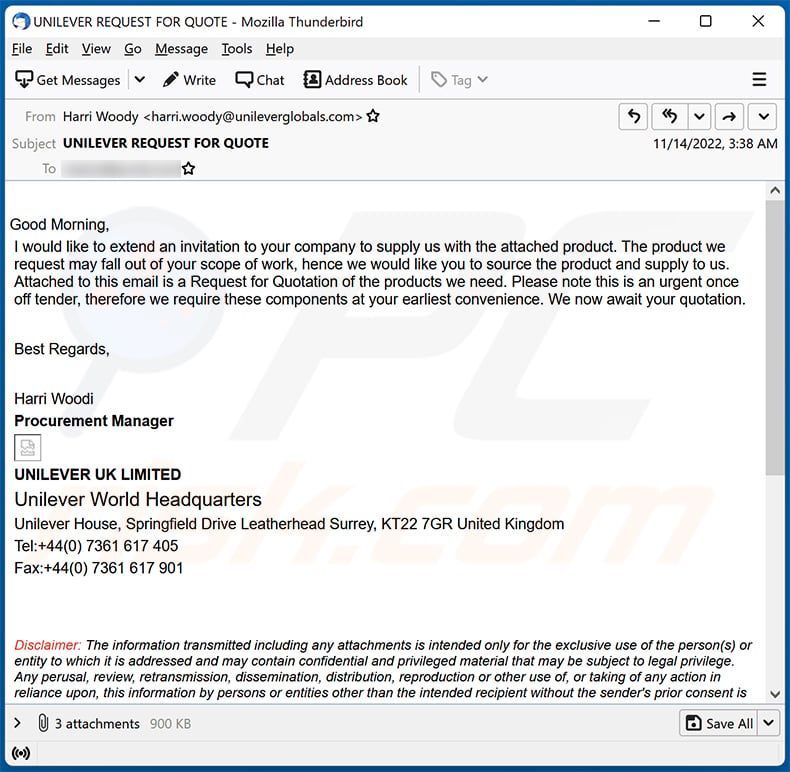
More about the UNILEVER malspam campaign
Cyber criminals behind the "UNILEVER Email Virus" email claim to be representatives of Unilever, a well-known consumer goods company. According to the email, it was sent by Jon Strachan, Vice President - Supply chain. This person does work for this company, however, neither he nor Unilever has anything to do with this scam.
The email details an invoice and contains an attached order. As mentioned above, this email scam is used to proliferate the LokiBot virus, a computer infection (trojan-type malware) designed to gather information such as passwords, logins, etc. and also to track data such as keystrokes.
Having a computer infected with a virus of this type might lead to serious privacy issues, financial loss, and other problems. Opening the attachment presented in the "UNILEVER Email Virus" email leads to download/installation of the trojan-type infection.
If installed, it can be detected as the "Senhaja" process (32-bit or 64-bit) in Windows Task Manager. If you receive this email, ignore it, and certainly do not open the associated attachment.
| Name | UNILEVER spam |
| Threat Type | Trojan, password-stealing virus, banking malware, spyware. |
| Hoax | Email contains a request for quotation, invoice, or other document. |
| Symptoms | Trojans are designed to stealthily infiltrate the victim's computer and remain silent, and thus no particular symptoms are clearly visible on an infected machine. |
| Payload | LokiBot |
| Distribution methods | Infected email attachments. |
| Damage | Stolen passwords, banking information, and other sensitive information, identity theft, data loss. |
| Malware Removal (Windows) |
To eliminate possible malware infections, scan your computer with legitimate antivirus software. Our security researchers recommend using Combo Cleaner. Download Combo CleanerTo use full-featured product, you have to purchase a license for Combo Cleaner. 7 days free trial available. Combo Cleaner is owned and operated by RCS LT, the parent company of PCRisk.com. |
Examples of similar malspam campaigns
There are many such campaigns used to scam users. Some examples include American Express Email Virus, Apple Email Virus, and IRS Email Virus.
Different scams are used to proliferate different computer infections (such as Adwind, FormBook, TrickBot, Emotet, etc.) - they are usually distributed through attachments or web links. These viruses steal personal data, and thus we strongly recommended that you remove them immediately.
How did "UNILEVER Email Virus" infect my computer?
Like most spam campaigns of this type, the virus only infects computers when the presented attachment is opened and permission to install the rogue software is given. Malicious attachments are often Microsoft Office documents, PDF, archive, and executable files.
For example, if the file is an MS Office document, once opened, it requests permission to enable macros commands. Enabling them allows a computer infection to be installed. Note that these infected attachments cannot do any harm if they are not opened.
How to avoid installation of malware?
Never open email attachments that are delivered in emails received from suspicious or unknown addresses, or if the email is not specifically relevant to you. Scammers often hide behind well-known company names, however, these are just attempts to make the emails and presented attachments seem legitimate.
The most efficient way to avoid infections proliferated through these attachments is to simply ignore the email not open the file. Also have reputable anti-virus or anti-spyware software installed to keep computers safe. If you have already opened a "UNILEVER Email Virus" attachment, we recommend running a scan with Combo Cleaner Antivirus for Windows to automatically eliminate infiltrated malware.
Text presented within this spam email:
Subject: UNILEVER REQUEST FOR QUOTE
Good Morning,
I would like to extend an invitation to your company to supply us with the attached product. The product we request may fall out of your scope of work, hence we would like you to source the product and supply to us. Attached to this email is a Request for Quotation of the products we need. Please note this is an urgent once off tender, therefore we require these components at your earliest convenience. We now await your quotation.
Best Regards,
Harri Woodi
Procurement Manager
UNILEVER UK LIMITED
Unilever World Headquarters
Unilever House, Springfield Drive Leatherhead Surrey, KT22 7GR United Kingdom
Tel:+44(0) 7361 617 405
Fax:+44(0) 7361 617 901
Another example of UNILEVER-themed spam email:
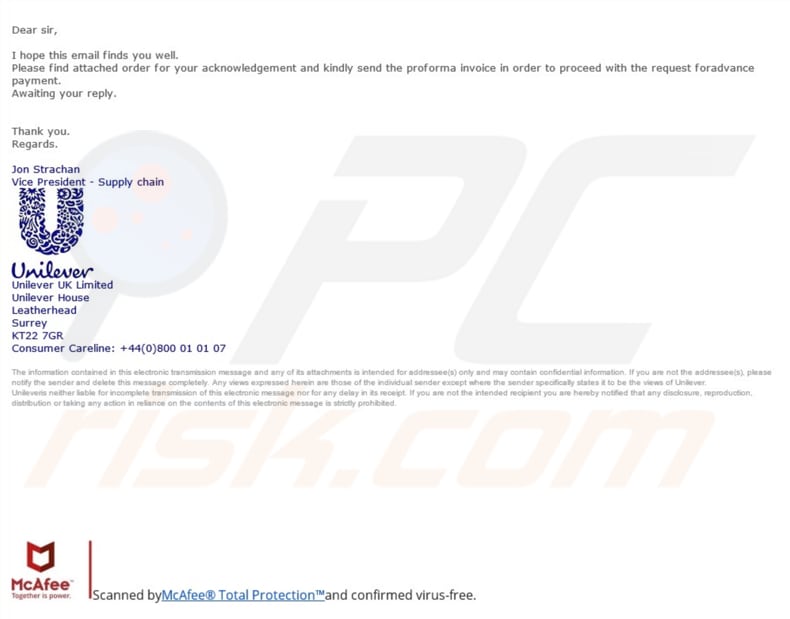
Text presented within:
Subject: UNILEVER PURCHASE ORDER #091223 for acknowledgement
Dear sir,
I hope this email finds you well.
Please find attached order for your acknowledgement and kindly send the proforma invoice in order to proceed with the request foradvance payment.
Awaiting your reply.
Thank you.
Regards.
Jon Strachan
Vice President ñ Supply chain
Unilever UK Limited
Unilever House
Leatherhead
Surrey
KT22 7GR
Consumer Careline: +44(0)800 01 01 07The information contained in this electronic transmission message and any of its attachments is intended for addressee(s) only and may contain confidential information. If you are not the addressee(s), please notify the sender and delete this message completely. Any views expressed herein are those of the individual sender except where the sender specifically states it to be the views of Unilever.
Unileveris neither liable for incomplete transmission of this electronic message nor for any delay in its receipt. If you are not the intended recipient you are hereby notified that any disclosure, reproduction, distribution or taking any action in reliance on the contents of this electronic message is strictly prohibited.
Screenshot of a LokiBot malicious process in Task Manager (Senhaja (32-bit)):
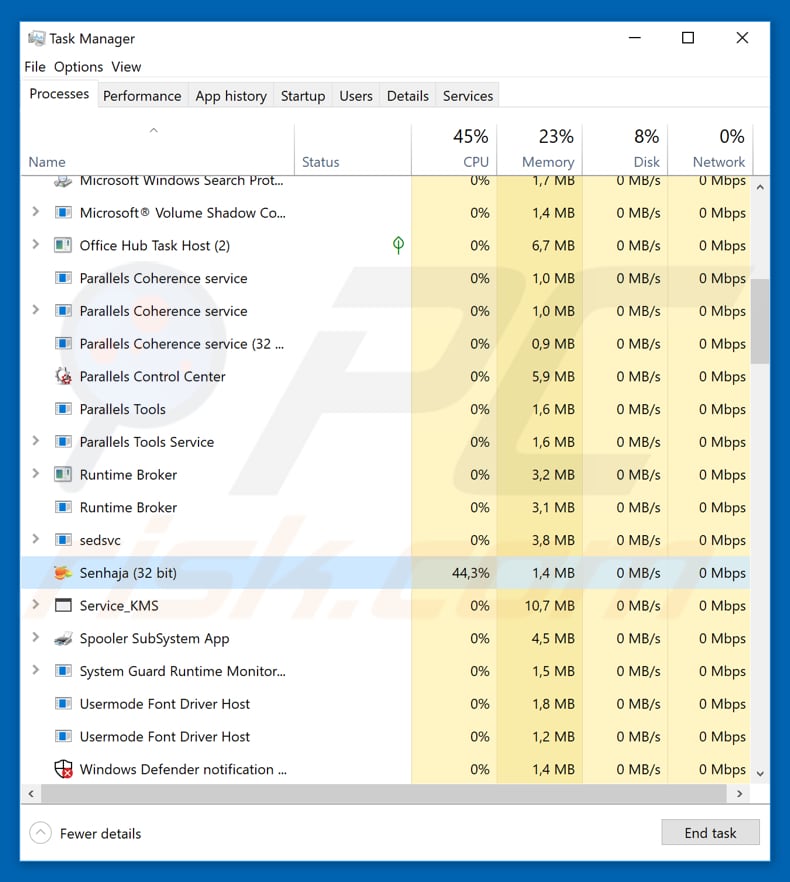
Another example of UNILEVER-themed spam email:
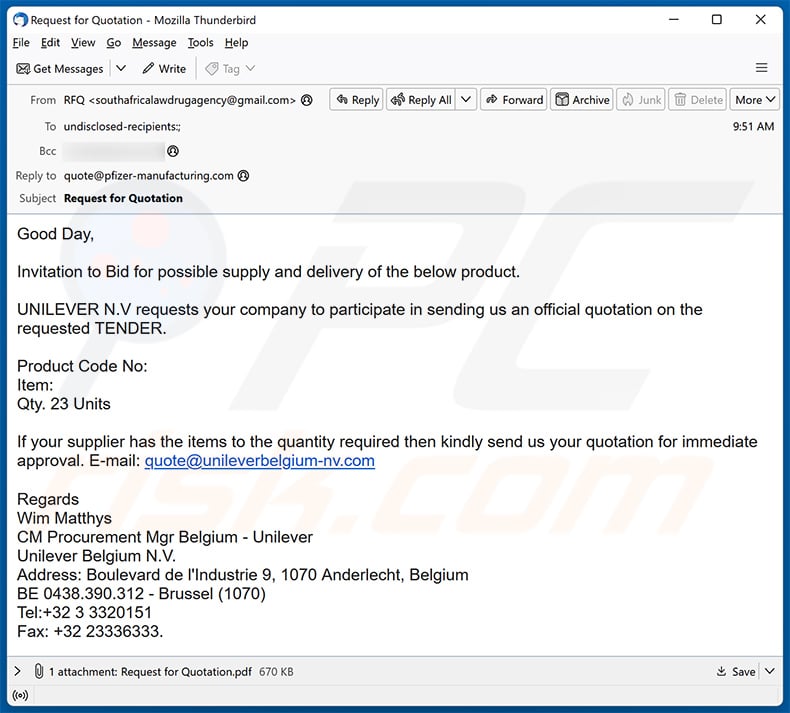
Text presented within:
Subject: Request for Quotation
Good Day,
Invitation to Bid for possible supply and delivery of the below product.
UNILEVER N.V requests your company to participate in sending us an official quotation on the requested TENDER.
Product Code No:
Item:
Qty. 23 Units
If your supplier has the items to the quantity required then kindly send us your quotation for immediate approval. E-mail: quote@unileverbelgium-nv.com
Regards
Wim Matthys
CM Procurement Mgr Belgium - Unilever
Unilever Belgium N.V.
Address: Boulevard de l'Industrie 9, 1070 Anderlecht, Belgium
BE 0438.390.312 - Brussel (1070)
Tel:+32 3 3320151
Fax: +32 23336333.
Screenshot of the attached PDF document:
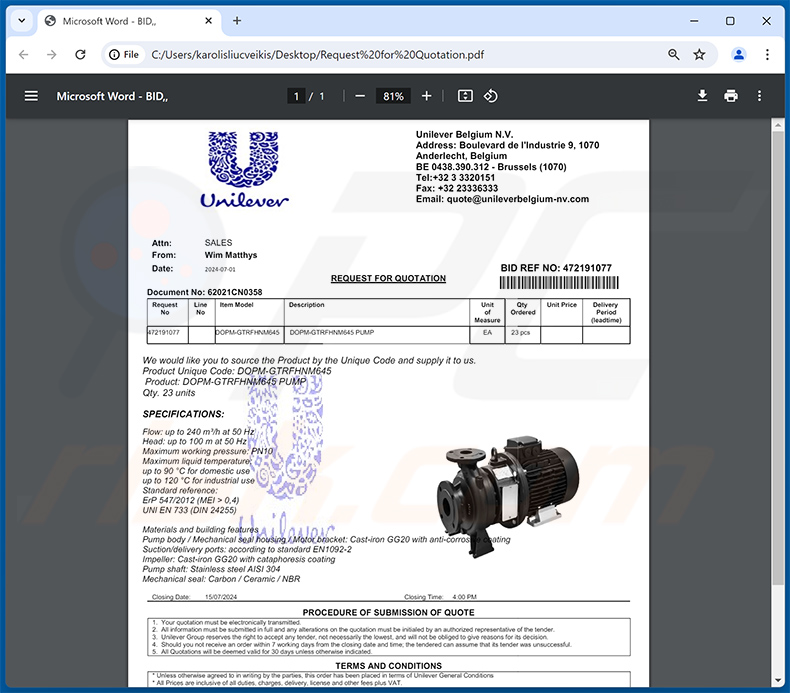
Yet another example of UNILEVER-themed spam email:
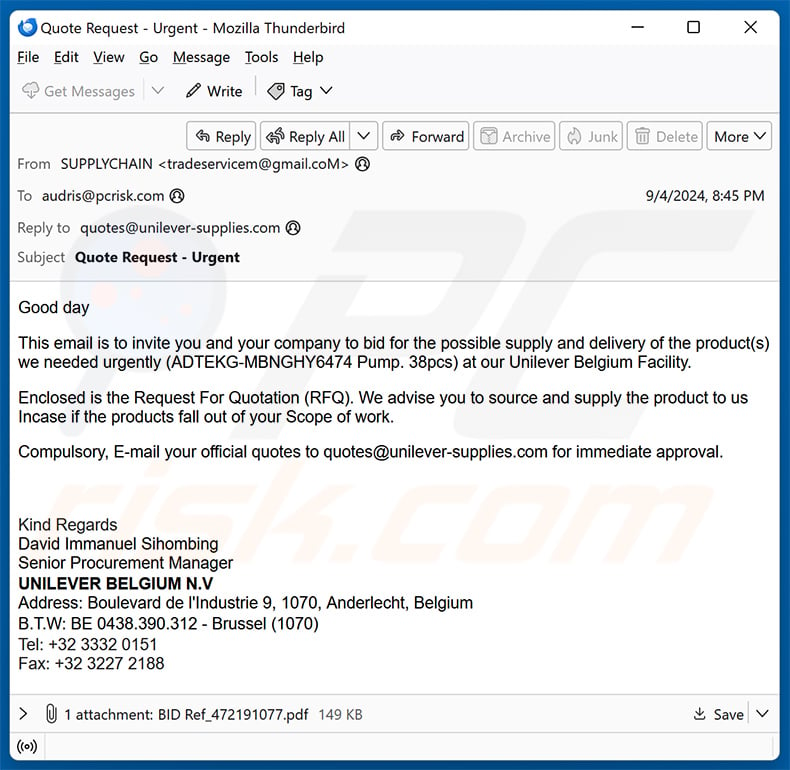
Text presented within:
Subject: Quote Request - Urgent
Good day
This email is to invite you and your company to bid for the possible supply and delivery of the product(s) we needed urgently (ADTEKG-MBNGHY6474 Pump. 38pcs) at our Unilever Belgium Facility.
Enclosed is the Request For Quotation (RFQ). We advise you to source and supply the product to us Incase if the products fall out of your Scope of work.
Compulsory, E-mail your official quotes to quotes@unilever-supplies.com for immediate approval.
Kind Regards
David Immanuel Sihombing
Senior Procurement Manager
UNILEVER BELGIUM N.V
Address: Boulevard de l'Industrie 9, 1070, Anderlecht, Belgium
B.T.W: BE 0438.390.312 - Brussel (1070)
Tel: +32 3332 0151
Fax: +32 3227 2188
Instant automatic malware removal:
Manual threat removal might be a lengthy and complicated process that requires advanced IT skills. Combo Cleaner is a professional automatic malware removal tool that is recommended to get rid of malware. Download it by clicking the button below:
DOWNLOAD Combo CleanerBy downloading any software listed on this website you agree to our Privacy Policy and Terms of Use. To use full-featured product, you have to purchase a license for Combo Cleaner. 7 days free trial available. Combo Cleaner is owned and operated by RCS LT, the parent company of PCRisk.com.
Quick menu:
- What is UNILEVER spam?
- Types of malicious emails.
- How to spot a malicious email?
- What to do if you fell for an email scam?
Types of malicious emails:
![]() Phishing Emails
Phishing Emails
Most commonly, cybercriminals use deceptive emails to trick Internet users into giving away their sensitive private information, for example, login information for various online services, email accounts, or online banking information.
Such attacks are called phishing. In a phishing attack, cybercriminals usually send an email message with some popular service logo (for example, Microsoft, DHL, Amazon, Netflix), create urgency (wrong shipping address, expired password, etc.), and place a link which they hope their potential victims will click on.
After clicking the link presented in such email message, victims are redirected to a fake website that looks identical or extremely similar to the original one. Victims are then asked to enter their password, credit card details, or some other information that gets stolen by cybercriminals.
![]() Emails with Malicious Attachments
Emails with Malicious Attachments
Another popular attack vector is email spam with malicious attachments that infect users' computers with malware. Malicious attachments usually carry trojans that are capable of stealing passwords, banking information, and other sensitive information.
In such attacks, cybercriminals' main goal is to trick their potential victims into opening an infected email attachment. To achieve this goal, email messages usually talk about recently received invoices, faxes, or voice messages.
If a potential victim falls for the lure and opens the attachment, their computers get infected, and cybercriminals can collect a lot of sensitive information.
While it's a more complicated method to steal personal information (spam filters and antivirus programs usually detect such attempts), if successful, cybercriminals can get a much wider array of data and can collect information for a long period of time.
![]() Sextortion Emails
Sextortion Emails
This is a type of phishing. In this case, users receive an email claiming that a cybercriminal could access the webcam of the potential victim and has a video recording of one's masturbation.
To get rid of the video, victims are asked to pay a ransom (usually using Bitcoin or another cryptocurrency). Nevertheless, all of these claims are false - users who receive such emails should ignore and delete them.
How to spot a malicious email?
While cyber criminals try to make their lure emails look trustworthy, here are some things that you should look for when trying to spot a phishing email:
- Check the sender's ("from") email address: Hover your mouse over the "from" address and check if it's legitimate. For example, if you received an email from Microsoft, be sure to check if the email address is @microsoft.com and not something suspicious like @m1crosoft.com, @microsfot.com, @account-security-noreply.com, etc.
- Check for generic greetings: If the greeting in the email is "Dear user", "Dear @youremail.com", "Dear valued customer", this should raise suspiciousness. Most commonly, companies call you by your name. Lack of this information could signal a phishing attempt.
- Check the links in the email: Hover your mouse over the link presented in the email, if the link that appears seems suspicious, don't click it. For example, if you received an email from Microsoft and the link in the email shows that it will go to firebasestorage.googleapis.com/v0... you shouldn't trust it. It's best not to click any links in the emails but to visit the company website that sent you the email in the first place.
- Don't blindly trust email attachments: Most commonly, legitimate companies will ask you to log in to their website and to view any documents there; if you received an email with an attachment, it's a good idea to scan it with an antivirus application. Infected email attachments are a common attack vector used by cybercriminals.
To minimise the risk of opening phishing and malicious emails we recommend using Combo Cleaner Antivirus for Windows.
Example of a spam email:

What to do if you fell for an email scam?
- If you clicked on a link in a phishing email and entered your password - be sure to change your password as soon as possible. Usually, cybercriminals collect stolen credentials and then sell them to other groups that use them for malicious purposes. If you change your password in a timely manner, there's a chance that criminals won't have enough time to do any damage.
- If you entered your credit card information - contact your bank as soon as possible and explain the situation. There's a good chance that you will need to cancel your compromised credit card and get a new one.
- If you see any signs of identity theft - you should immediately contact the Federal Trade Commission. This institution will collect information about your situation and create a personal recovery plan.
- If you opened a malicious attachment - your computer is probably infected, you should scan it with a reputable antivirus application. For this purpose, we recommend using Combo Cleaner Antivirus for Windows.
- Help other Internet users - report phishing emails to Anti-Phishing Working Group, FBI’s Internet Crime Complaint Center, National Fraud Information Center and U.S. Department of Justice.
Frequently Asked Questions (FAQ)
Why did I receive this email?
Emails of this kind are not personal. Typically, cybercriminals send the same letter to many people at once.
I have downloaded and opened a file attached to this email, is my computer infected?
If you have opened an executable file, then most probably, your computer is already infected. However, a computer may not be infected if the opened file is a document (.pdf, .doc, or similar). Opening a document is usually not enough for malware to infiltrate the system - computers are safe until macros commands are enabled, or other additional steps are performed.
I have read the email but didn't open the attachment, is my computer infected?
No, it is safe to open emails without clicking links or opening files.
Will Combo Cleaner remove malware infections that were present in email attachment?
Combo Cleaner includes an antivirus scanner that detects almost all known malware. It is important to mention that high-end malware usually hides deep in the operating system. In such cases, computers must be scanned using a full system scan to eliminate malware.
Share:

Tomas Meskauskas
Expert security researcher, professional malware analyst
I am passionate about computer security and technology. I have an experience of over 10 years working in various companies related to computer technical issue solving and Internet security. I have been working as an author and editor for pcrisk.com since 2010. Follow me on Twitter and LinkedIn to stay informed about the latest online security threats.
PCrisk security portal is brought by a company RCS LT.
Joined forces of security researchers help educate computer users about the latest online security threats. More information about the company RCS LT.
Our malware removal guides are free. However, if you want to support us you can send us a donation.
DonatePCrisk security portal is brought by a company RCS LT.
Joined forces of security researchers help educate computer users about the latest online security threats. More information about the company RCS LT.
Our malware removal guides are free. However, if you want to support us you can send us a donation.
Donate
▼ Show Discussion